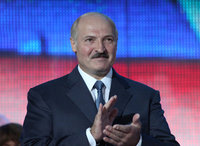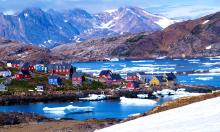Whatever happens, Belarus will stay with Russia - Lukashenko

Belarus remains a reliable strategic partner for Russia - this is a priority of foreign policy for Minsk, Belarusian President Alexander Lukashenko said in his annual address to the Belarusian people and the parliament.
The President of Belarus annually prepares addresses to the Belarusian people and the parliament. Traditionally, he designates key vectors of the country's development for next year, summing up most recent results and pointing out most acute problems. There is progress in the struggle against corruption, devaluation advances slowly, but the situation in the economy remains under control and is therefore stable, Lukashenko said. The main ally is still the Russian Federation. Foreign policy priorities have not changed.
"Whatever happens, we will be with Russia," said Alexander Lukashenko.
There are too many of those, who wish to drive a wedge in the relations with Russia, but the Belarusian leader has something to say to them. "I've heard a lot of interesting things lately. They told me that there were Russian tanks near our borders that took our border for the Ukrainian one, that the Russian Ambassador to Belarus Alexander Surikov was getting ready to become the president of Belarus. But, of course, I kick them all out of the door," said Lukashenko.
The complexity of the historical moment does not frighten Alexander Lukashenko. According to him, destabilizing the situation in today's Belarus is impossible. He even remembered the long-forgotten term "enemy of the people."
"The power is ready for a controlled, gradual and life-dictated revolution, but I am opposed to the destruction to the ground. Whoever calls for rebellion, is an enemy of not only the state and the president, but, above all, an enemy of our country and our people. Such radicalism will suppressed from the start, we will not take it to provocations and clashes," Lukashenko said.
According to Lukashenko, the main causes of the crisis in neighboring Ukraine is weak economy and endemic corruption. He vowed that it would be hard for corrupt officials in Belarus to even breathe.
Lukashenko mentioned the Western partners, whose participation in Ukrainian events is obvious. "There is a certain line, a Rubicon, which no state can cross without being punched in the face," he said.
Lukashenko assured that no one was going to attack Ukraine. "Lukashenko will not come to Kiev in a tank, Putin will not come in a tank either. Actually, I do not believe in Ukraine's NATO membership," said the Belarusian leader.
As for Lukashenko's position on the Ukrainian crisis, it remains uncertain. He recognized the return of the Crimea to the Russian Federation de facto but not de jure. He voted against the resolution condemning Russia at the UN General Assembly, but said that the federalization of Ukraine was not a necessary measure. "Federation is a piano, on which some forces will play on one side and other forces, including external ones - on the other side, - said Alexander Lukashenko. - Federation is very dangerous for the state. It means the war will continue, the internal conflict will continue to burn. Ukraine must remain a united, undivided, integrated, non-aligned state," he said.
It is obvious that Lukashenko does not want such a scenario for Belarus. Is there a threat to the integrity of Belarus at all? The ethnic composition of the country is more than just convincing. According to the last census of 2009, 84 percent of the population identify themselves as Belarusians, only 8 percent - as Russians, and 3.1 percent as Poles. Despite this, more than 85 percent of the population recognize the Russian language as their mother tongue. It is recognized (along with the Belarusian) a state language of the country.
Belarus has no analogues to Ukraine's pro-fascist activists, such as Bandera, so inciting national strife in Ukraine is a hard nut to crack. To crown it all, Belarus and the Russian Federation are highly integrated. On May 1, the countries will sign the treaty on the creation of the European and Asian Economic Cooperation. Therefore, the Crimean variant of protests, which could be initiated by ethnic Russians, is not an option at all. Belarusians and Russians consider themselves one single nation.
Subscribe to Pravda.Ru Telegram channel, Facebook, RSS!





